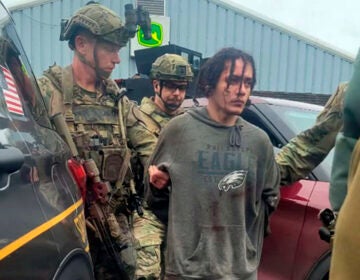Harrisburg launches pilot program for police body cameras

Harrisburg Police Officer Josh Hammer, Mayor Eric Papenfuse and Capt. Deric Moody address reporters during a press conference about the city's body cameras pilot program. (Emily Previti)
The capital city joins a small group of Pennsylvania municipalities that have tested or permanently integrated the equipment.
The city of Harrisburg is testing out police body cameras, joining a small group of communities using the technology in Pennsylvania.
And more municipalities are expected to follow suit, after changes to state law.
Harrisburg’s two-month trial program started this week.
Cameras will initially be worn by eight police officers. The program is expected to expand to all 75 patrol officers next year. The overall cost is not yet known, but data storage alone is estimated at $70,000 annually.
City officials say dozens of companies clamored to supply cameras and free training. But they wouldn’t disclose the four selected for the trial phase.
Mayor Eric Papenfuse says one main benefit of body cameras is they produce an objective record.
“There have been incidents in which there has been a discrepancy over what was said or how an officer acted, and I do believe that having the cameras there will clarify a lot and make it easier to understand exactly what happened,” he says.
Harrisburg Police Capt. Deric Moody expects more Pennsylvania departments will begin trying cameras now that the state’s Wiretap Act has changed — clarifying that officers can gather footage inside a home while on duty.
“Prior to this, if you went into a residence, you had to — at a time that was reasonably practical — you had to tell the person, and the person had the ability to say, ‘You’re not recording in my house,’ and it really limited what the camera could do,” he says.
State lawmakers removed that consent requirement earlier this year with Act 22. The new law, which passed with overwhelming majorities in the House and Senate (and no discussion on final passage), also makes it harder for the public to obtain police body camera footage.
Papenfuse says the city will comply with the law and for now consider requests on a case-by-case basis, although he’d like Harrisburg’s public access policy to be more liberal in the future.
Formal policies for body camera use, officer training, discipline for related infractions and storage also haven’t yet been set. Those ground rules require consensus between the police department and the Fraternal order of Police, to be integrated within the contract between the city and union.
But there are some clear rules in place for Harrisburg officers, according to Moody, such as requiring them to activate cameras upon getting a call for service rather than waiting until arriving on scene.
Police in York, Carlisle and Philadelphia already use body cameras, along with SEPTA police. Pittsburgh has started a pilot program.
In Philadelphia, anecdotal results have been encouraging, but logistical challenges loom over wider implementation.
In San Diego, body cameras have been credited with significant decreases in police misconduct allegations and uses of force by officers.
Even with changes to state law, some municipalities — such as Lancaster and Susquehanna Township — aren’t rushing to integrate cameras into local policing, in part due to the expense of storing data.
WHYY is your source for fact-based, in-depth journalism and information. As a nonprofit organization, we rely on financial support from readers like you. Please give today.






